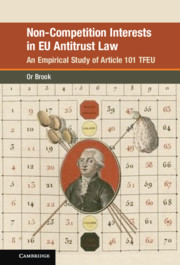Book contents
- Non-Competition Interests in EU Antitrust Law
- Global Competition Law and Economics Policy
- Non-Competition Interests in EU Antitrust Law
- Copyright page
- Contents
- Figures
- Tables
- Acknowledgements
- Definitions
- Abbreviations
- 1 Introduction and Methodology
- 2 History of Article 101 TFEU Balancing
- 3 Article 101(3) TFEU
- 4 Block Exemption Regulations
- 5 Article 101(1) TFEU
- 6 National Balancing Tools
- 7 Enforcement Discretion
- 8 Conclusion
- Book part
- Laws, Regulations, Reports, and Policy Papers
- Case Law
- Bibliography
- Index
7 - Enforcement Discretion
Published online by Cambridge University Press: 06 June 2022
- Non-Competition Interests in EU Antitrust Law
- Global Competition Law and Economics Policy
- Non-Competition Interests in EU Antitrust Law
- Copyright page
- Contents
- Figures
- Tables
- Acknowledgements
- Definitions
- Abbreviations
- 1 Introduction and Methodology
- 2 History of Article 101 TFEU Balancing
- 3 Article 101(3) TFEU
- 4 Block Exemption Regulations
- 5 Article 101(1) TFEU
- 6 National Balancing Tools
- 7 Enforcement Discretion
- 8 Conclusion
- Book part
- Laws, Regulations, Reports, and Policy Papers
- Case Law
- Bibliography
- Index
Summary
This chapter examines the implicit-procedural balancing tools, embedded in the exercise of the competition enforcers’ discretion and priority setting powers. Modernisation has entrusted the Commission and NCAs with a new balancing tool in the form of their discretional enforcement powers. Moreover, it has incentivised the Commission and NCAs to direct their enforcement efforts towards clear-cut infringements of Article 101 TFEU, which are unlikely to be justified by overriding non-competition interests. The competition enforcers have used their detection, target, instrument, and outcome discretion to decide not to enforce Article 101 TFEU against other types of agreements even when they do not meet the conditions for an exception under Article 101(1) and (3) TFEU. As a result, investigations into agreements that raised balancing questions were often settled with negotiated remedies or terminated by closing the probe into the case altogether. The chapter investigated various aspects of priority setting, including the selection of a strategy for identifying anti-competitive behaviour; the choice of whether to open an investigation and pursue a case; choice of enforcement instrument (sector regulation, markets-work, informal opinions, and the effect on trade test); and selection of remedies (fines, commitments, and findings of inapplicability).
Keywords
- Type
- Chapter
- Information
- Non-Competition Interests in EU Antitrust LawAn Empirical Study of Article 101 TFEU, pp. 310 - 401Publisher: Cambridge University PressPrint publication year: 2022

